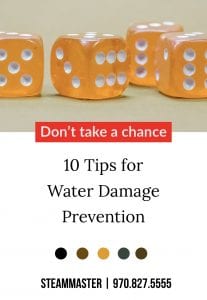Water Damage Prevention
Water damage prevention tips listed below will give you an opportunity to put in place several preventative measures in your home. It is better than dealing with a water damage which is expensive, disruptive and can be very troublesome. Here are some preventative solutions to help you.
1. All exterior hoses must be disconnected. Water standing in outdoor hoses may freeze in cold temperatures and extend into the pipe indoors creating an ice block. With an extended period, the swell may cause the pipe to burst, and when thawed, water damage can cause severe issues in the interior of the home.
2. There is still time to check on gutters and downspouts to ensure there are clean and free from debris that may have blocked these channels.
Removing blocked passages will prevent standing water causing ice dams, thus creating leaks and water damage to the structure. Ensure that the downspout is placed away from the home so that it does not flow directly by the foundation wall with potential cracks into basement or crawl space.
3. It is essential to pay attention to surrounding trees, vegetation and landscape are critical to minimizing damage to utility pipes. Ensure the overgrowth of these trees does not take over or cause harm from their roots underground is a proactive measure to prevent water damage.
4. Knowing your water damage shut off is critical for every adult in your home, mostly located in your mechanical room. In a water damage situation, any adult can quickly identify and turn the main water shut to stop water flow. SteamMaster provides these tags for free. It is designed as a red stop sign and brightly laminated for easy sight. Call us at 970.827.5555 to get yours free. When you are away for an extended period of time this is a good resource for steps to take.
5. Appliances especially the ones that channel water must be checked regularly for leaks. See the manufacturer’s direction for replacing parts periodically as recommended.
6. Do not prolong or postpone any known leak however small it may be. Make the necessary repairs immediately or hire the right professional to fix what is damaged. Delay may cause secondary damage to the structure and personal contents in a property. Most standard Insurance policies require homeowners to repair or replace faulty appliances or leak immediately. Damage from lack of maintenance or ignoring what is obvious may result in denial of coverage.
7. Check to replace the washing machine hoses. If you notice any signs of wear, brittleness or leak immediately change these out — the cost of these hoses or hundreds of times less than what you may incur in comparison after a water damage restoration.
8. Consider installing water leak detection devices. Your plumber can help to recommend the most effective water loss detector and prevent significant water damage in your property. Leak detector devices are installed near water heaters, sump pumps, dishwasher, toilet line, washing machines, and other water supply lines in your home.
9. A typical residential water pressure line is around 40 to 70 psi. Your plumber can verify and recommend to you what is appropriate. Having this setting at the right pressure will keep the hoses and pipes in good working condition. A water pressure gauge can also be purchased at a hardware store if you know how to use them on a faucet outside your home.
10. Check your utility water bill and monitor the usage on a regular month and compare when there is a high volume use. When you are aware of these charges and usage, in general, you may be familiar with the accepted monthly usage. When there is a sudden surge noticed you might want to check your crawl space for any unattended leak or water damage unknown because it is not seen or inspected.

